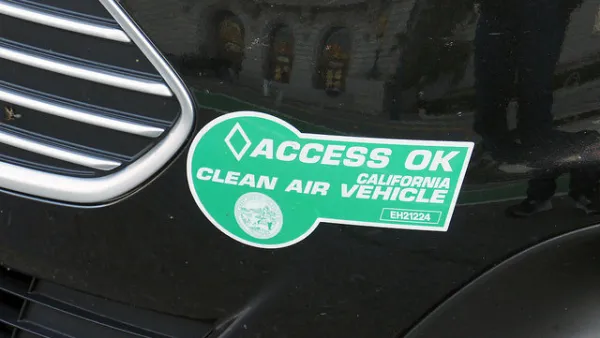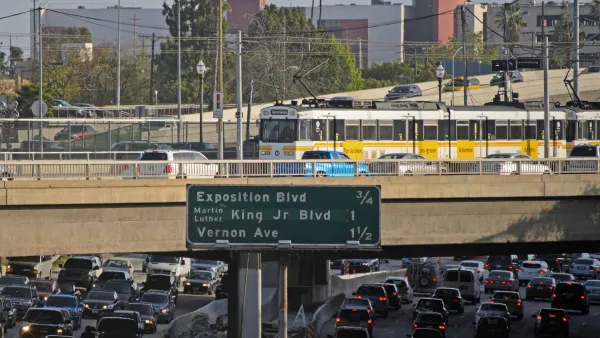Sales taxes are regressive, but unlike the gas tax, they bear no relationship to transportation. Should a November transportation ballot measure pass, sales taxes in three cities in the county of Los Angeles would exceed 10 percent.
Should L.A. Metro's $120 billion transportation plan pass in November by a two-thirds vote threshold, it would extend an existing half-cent sales tax (2008, 30-year Measure R) for 18 years past 2039 and add a new half-cent sales tax, effective fiscal year 2018, for 40 years.
The "measure would be the fourth sales tax increase in L.A. county since 1980, bringing the base sales tax to 9.25 percent," writes Meghan McCarty, who covers commuting and mobility issues for KPCC, Southern California Public Radio.
But in some cities the increase would be even higher, among them La Mirada, Pico Rivera and South Gate, which have the highest sales tax rates in the county and the state at 10 percent. A half cent hike for these cities would match Chicago's 10.25 percent rate, the highest in the country.
The statewide sales tax of 7.50 percent is due to decrease by .25 percent at the end of this year due to the expiration of the 2012 Prop. 30 temporary income and sales tax measure. Should an extension of Prop 30 be placed on the ballot (as some groups are proposing) and pass with 50 percent +1 votes, the sales tax increase resulting from the passage of the Metro measure would be a full .5 percent.
Eight other cities in L.A. county have sales tax rates of 9.5 percent: Avalon, Santa Monica, Culver City, South El Monte, Commerce, San Fernando, Inglewood and El Monte.
[To look up the sales tax rate for a location in California, enter an address on this California Board of Equalization website.]
McCarty points to South Gate's low median (household) income, "$43,500, about $10,000 less than the median income for L.A. county," with "21 percent of the population living below federal poverty levels," according to census figures, which should raise equity issues when increasing the sales tax. Median household income in California is $61,632.
Sales taxes are considered regressive because they burden low-income people more as a percentage of total income.
Defending the use of sales taxes for transportation, UCLA Professor Keith Elkind indicates that "most transit agencies have come to rely on sales tax revenue as the largest share of funding as state and federal money has dried up," writes McCarty. "Sales tax revenues make up two-thirds of L.A. Metro's funding."
An alternative to sales taxes to fund the road projects in the November measure would be to hike road tolls.
A USC-UCLA study in 2008 found using revenues from toll lanes, like the ones on the 110 and 10 freeways, was a more equitable way to fund road improvements than the more politically popular sales tax because it resulted in more wealthy and middle-income people paying, and doing so by choice.
Of course, hiking those tolls could add fodder to the "Lexus Lane" argument against high-occupancy-toll (HOT) lanes, although the abstract states "(l)ow-income drivers as individuals save substantially if they do not have to pay tolls, but as a group low-income residents, on average, pay more out-of-pocket with sales taxes."
The November measure will be the second attempt to extend the 30-year Measure R, which barely passed in 2008, that took effect July 2009. An attempt in "2012 [Measure J] failed to pass the necessary 67 percent threshold by less than 16,000 votes (out of nearly 2 million cast)," notes a 2014 post when Metro was considering another attempt to pass an extension.
The county of Los Angeles, with a population of more than 10 million in its 88 incorporated cities plus unincorporated areas, is the most populous in the United States.
"[W]ith the County’s population expected to grow by 750,000 over the next decade, we cannot afford to be in chronic gridlock," stated L.A. Mayor Eric Garcetti, as reported by City New Service. "We must act now.”
Hat tip to L.A. Transportation Headlines (by Metro)
FULL STORY: Metro's ballot measure tax would hit some areas harder than others

Analysis: Cybertruck Fatality Rate Far Exceeds That of Ford Pinto
The Tesla Cybertruck was recalled seven times last year.

National Parks Layoffs Will Cause Communities to Lose Billions
Thousands of essential park workers were laid off this week, just before the busy spring break season.

Retro-silient?: America’s First “Eco-burb,” The Woodlands Turns 50
A master-planned community north of Houston offers lessons on green infrastructure and resilient design, but falls short of its founder’s lofty affordability and walkability goals.

Test News Post 1
This is a summary

Analysis: Cybertruck Fatality Rate Far Exceeds That of Ford Pinto
The Tesla Cybertruck was recalled seven times last year.

Test News Headline 46
Test for the image on the front page.
Urban Design for Planners 1: Software Tools
This six-course series explores essential urban design concepts using open source software and equips planners with the tools they need to participate fully in the urban design process.
Planning for Universal Design
Learn the tools for implementing Universal Design in planning regulations.
EMC Planning Group, Inc.
Planetizen
Planetizen
Mpact (formerly Rail~Volution)
Great Falls Development Authority, Inc.
HUDs Office of Policy Development and Research
NYU Wagner Graduate School of Public Service



























